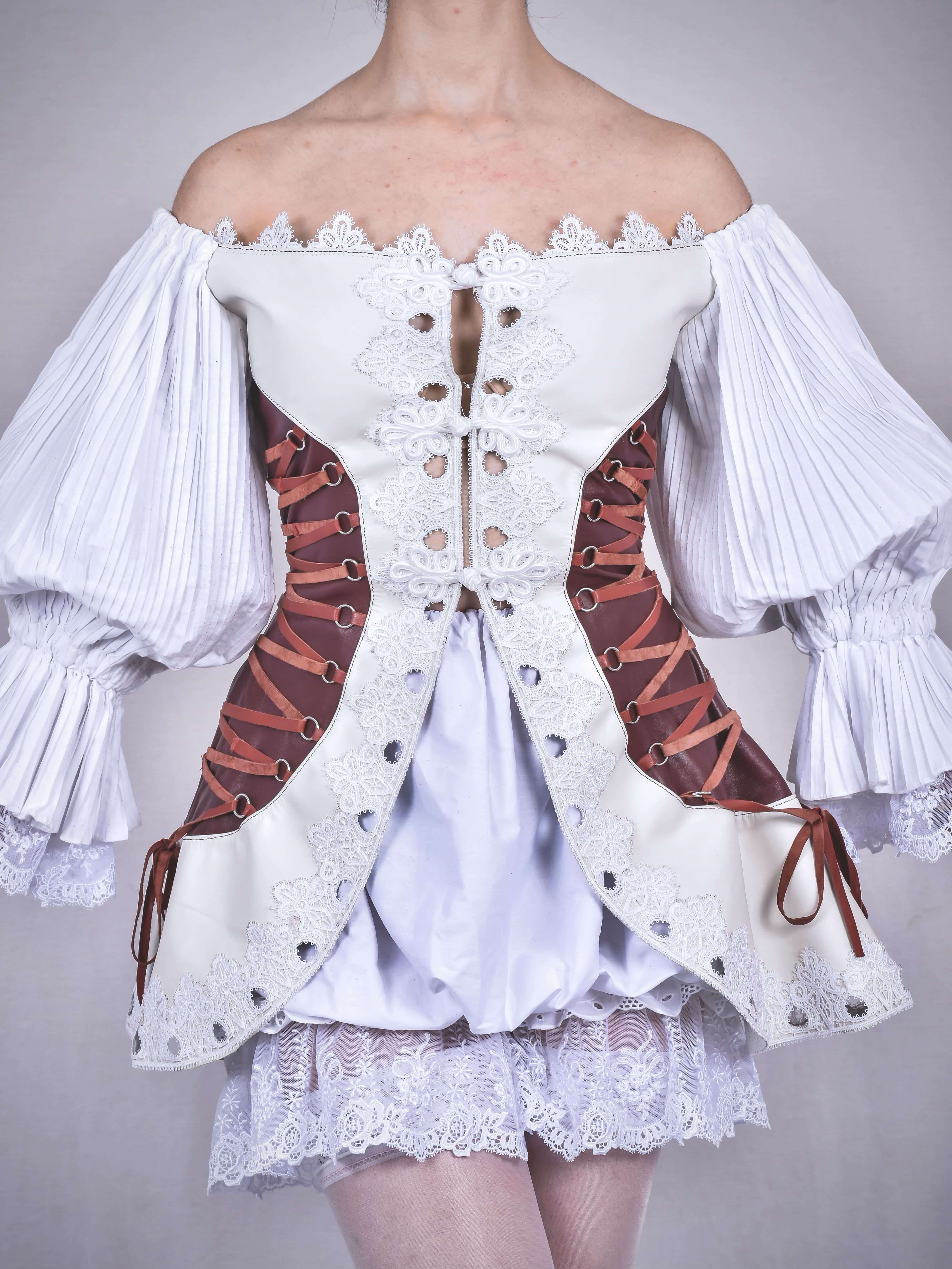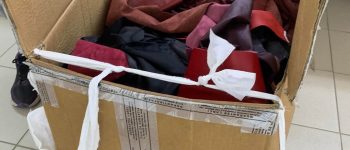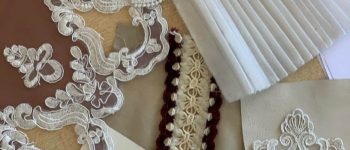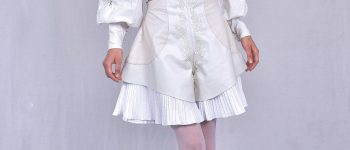For two years, my daily university commute drove me by the textile industry hub in Monastir, where picturesque beaches turned into lifeless marine wastelands. In 2013, “Kssibet El Madiouni” was at the heart of protests against an ecological crisis known as the “triangle of death.”
Startling data reveals that Morocco and Tunisia lose 100,000 tons of textile material annually as pre-consumer waste, according to a waste mapping study, commissioned by the “UNIDO”. In 2022, the European Union alone imported 11 million pairs of jeans from Tunisia, Each pair requires 55 to 72 liters of water, heavily contributing to marine pollution of the dead ocean in Kssibet El Madiouni, Monastir as reported by Avocats Sans Frontières (ASF) and FTDES in August 2023
In 2023 I had an internship within a tunisian factory producing garments for renown international bands such us Paco Rabanne Burberry and Nina Ricci, where I have witnessed the enormous amounts of leather waste they are producing that after some investigations I realized it all gets burned or dumped into landfills
This issue has sparked within me the desire to enact a change and find a solution for their production waste and stop this environmental damage
harnessing my pattern making skills and developing craftsmanship technique I made new canvas from the leather scraps, to create a an eco friendly and sustainable collection made from 100% upcycled materials, and reducing waste by 80%.
The fact of succeeding in reducing their manufacturing waste by turning it into useful garments combined by the urgency to finding solutions for the high environmental and ethical cost we are paying in exchange of our garments have only further strengthened my decision to lead a change in the industry.
This is why I am harnessing my knowledge from my previous fashion design studies and professional experiences to establish an innovative, sustainable fashion and textiles brand built on five core pillars:
-AI-Powered Sorting & Recycling Technologies – Utilizing AI to categorize textile waste by fiber type for optimal reuse and recycling.
-T2T (Textile-to-Textile) Recycling Technology – Transforming discarded fabrics into new high-quality fibers, reducing dependency on virgin materials and promoting a circular economy.
-Slow-Made & Made-to-Fit Artisanal Garments – Creating handcrafted, made-to-order fashion pieces using 100% upcycled materials and eco-friendly fibers, reducing overproduction and waste.
-Take-Back Program for Circularity – Encouraging consumers to return old garments for recycling, significantly reducing post-consumer waste.
-Industry-Wide Waste Reduction – Collaborating with African textile manufacturers, such as SARTEX and DEMCO, to scale circular fashion solutions and integrate sustainable materials into the broader textile industry.
Through the implementation of AI-powered sorting, alternative eco-friendly fabrics, and T2T recycling, this initiative will significantly reduce landfill waste, emissions, and water pollution, while promoting sustainable production and responsible consumer behavior.
2. Technological & Process Innovation
-AI-Powered Sorting for Textile Waste Reduction
Problem: The inefficient sorting of pre- and post-consumer textile waste results in excessive landfill contributions and prevents effective material reuse.
Solution: The implementation of AI-powered sorting technologies, similar to Fibersort and Resyntex, will enable efficient fiber classification, allowing high-value recycling and material recovery.
Impact: The project is expected to increase textile recovery rates by 30%, reduce the need for labor-intensive manual sorting, and streamline processing for closed-loop manufacturing.
-T2T (Textile-to-Textile) Recycling Technology
Problem: Traditional recycling methods degrade fiber quality, limiting the usability of recovered textiles.
Solution: T2T recycling processes, such as mechanical and chemical fiber regeneration, will transform discarded fabrics into high-quality new fibers without compromising durability. This ensures that textile waste is effectively reintegrated into the production cycle.
Impact: This approach will reduce reliance on virgin fibers, decrease water and chemical consumption in textile production, and enhance circularity in the fashion industry.
-Take-Back Program for Circularity
Problem: Post-consumer textile waste is a largely unaddressed issue in the sustainable fashion movement, with most initiatives focusing on pre-consumer waste.
Solution: A take-back program will be implemented, enabling customers to return used garments for recycling or upcycling. This program incentivizes participation through discounts or credits toward new purchases.
Impact: The initiative will provide a steady supply of raw materials for upcycled fashion and is expected to reduce textile landfill waste by 25% within the first three years.
-Made-to-Fit & Made-on-Demand Artisanal Fashion Production
Problem: The fashion industry is plagued by overproduction, leading to excessive waste, unsold inventory, and environmental harm.
Solution: The project will embrace a slow fashion approach by offering handcrafted, made-to-fit, and made-on-demand garments, ensuring that every piece is created only when needed. By prioritizing local sourcing, zero-impact fibers, and chemical-free, natural dye alternatives, this initiative supports ethical, sustainable fashion.
Impact: Reduces overproduction waste by up to 40%, enhances the exclusivity and longevity of garments and promotes sustainable luxury and craftsmanship
Partnerships with African Manufacturers
To ensure scalability and technological innovation, the project collaborates with leading African textile manufacturers:
SARTEX: A UN Global Compact program member focused on sustainable textile manufacturing.
DEMCO: A pioneer in closed-loop dyeing systems, reducing water consumption and chemical use.
A pilot program will be launched to recover 10,000 kg of textile waste from partner factories in the first year, experimenting with AI-sorted fabric streams and T2T recycling technologies.
3. Business Model: B2B & B2C Approach
This project operates under a dual business model, ensuring scalability and impact across multiple levels:
Business-to-Business (B2B):
-Sale of recycled and upcycled textiles to sustainable fashion brands, manufacturers, and eco-conscious retailers.
-Licensing of AI-powered sorting and T2T recycling technology to textile companies and waste management firms.
-Collaborations with brands seeking sustainable fabric alternatives for circular production.
Business-to-Consumer (B2C)
-Direct-to-consumer sales of made-to-fit, made-on-demand artisanal garments, eliminating excess production waste.
-Take-back program offering incentives for consumers who return old garments, creating a closed-loop system.
-E-commerce platform and pop-up events promoting ethical fashion and consumer awareness.
4. Project Timeline & Scalability
The project will be executed in three phases, ensuring a structured approach toward impact-driven expansion:
-Phase 1: Pilot (Year 1)
Establish collaborations with SARTEX & DEMCO.
Collect and sort 10,000 kg of textile waste.
Develop and test the first AI-powered sorting system prototype.
Initiate T2T recycling trials and establish efficiency benchmarks.
-Phase 2: Scaling (Years 2-3)
Expand to additional African textile manufacturers.
Increase textile recovery to 50,000 kg per year.
Launch the first consumer-ready upcycled fashion line.
Achieve a 20% reduction in production-related emissions.
-Phase 3: Global Expansion (Years 4-5)
Establish AI-driven and T2T textile recovery hubs.
Form partnerships with international retailers.
Introduce sustainable fabric licensing for other brands, expanding the impact on the global fashion industry.
5. Expected Impact & Conclusion
By integrating cutting-edge technologies with sustainable craftsmanship, this project will:
Reduce textile waste landfill contributions by 50% within partnered factories.
Enhance AI-sorting efficiencies and T2T recycling to enable large-scale fabric recycling.
Revive artisanal craftsmanship through slow, sustainable fashion practices.
Encourage responsible consumption by making sustainable fashion more accessible.
Empower consumers through the take-back program, creating a more circular fashion system.
This initiative is not just a brand—it is a movement toward a circular textile economy in Africa and beyond. Through partnerships, technology, and innovation, this project aims to set a new standard for ethical, waste-free fashion while offering scalable solutions for sustainable textile production on an international level.
This contributes significantly to environmental pollution, with the industry responsible for 10% of global carbon emissions.
We consume 62 million tonnes of textiles per year. By 2030, this is expected to reach 102 million tonnes
The fashion industry accounts for 8.1% of global greenhouse gas emissions.
87% of the total fibre input used for clothing is either landfilled or incinerated, with less than 1% being recycled into new garments
The fashion industry is responsible for 20% of global water waste
Approximately 35% of all primary microplastic pollution in the ocean comes from the fashion industry, particularly from synthetic fibres such as polyester, nylon, and acrylic
Textile dyeing is the second-largest polluter of water globally, contributing significantly to water pollution
This project introduces an innovative, sustainable fashion and textile project built on five core pillars:
-AI-Powered Sorting & Recycling Technologies
-T2T (Textile-to-Textile) Recycling Technology
-Slow-Made & Made-to-Fit Artisanal Garments
-Take-Back Program for Circularity
-Industry-Wide Waste Reduction
Through the implementation of AI-powered sorting, alternative eco-friendly fabrics, and T2T recycling, this initiative will significantly reduce landfill waste, emissions, and water pollution, while promoting sustainable production and responsible consumer behavior.
- Clothing manufactureurs (to collact textile waste for upcycling and recycling)
- Local artisans
- International recycling technology providers "Fibersort (Netherlands), Resyntex (EU), Renewcell (Sweden) and Circ (USA)"
- Sustainable fashion brands
- Global retailers






